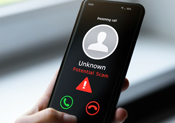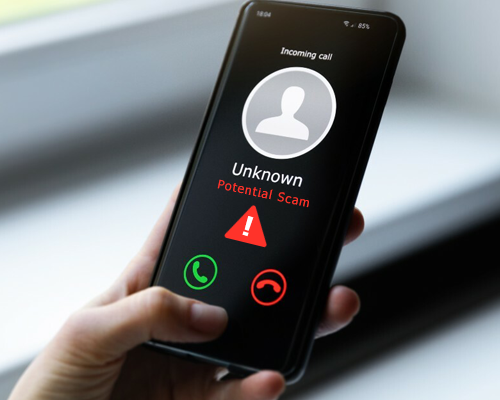Register
Worth Ave. Group - Providing peace of mind to consumers for over 50 years.
How to Recognize a Phone Scam
Posted:
February 25, 2022
Categories:
General


The current COVID-19 pandemic seems to create a perfect environment for scammers – phone scams are on the rise, while people are losing more money in these scams than ever. Although they often target young people and senior citizens, just about anyone can fall victim to them since they are using more sophisticated tactics and are becoming more organized in their approach. Phone scams may come through phone calls from real people, robocalls, or text messages, but they all have one goal – to steal your money or personal information.
Warning signs of a phone scam
They contact you and ask for your personal information: If someone you didn’t contact asks for your personal information, like your name, address, Social Security number, bank account information, or credit card number, you’re on the line with someone hoping to scam you. If you didn’t make the call, you can't be certain who is on the line. Never give out sensitive information to someone you don’t know and who calls you unexpectedly, even if they say they’re from a government agency.

They ask you if you can hear them: The caller starts the call with “Can you hear me?” or a question to which you are inclined to reply with a “yes”. This is a common tactic used by scammers to record you saying “yes” and use it to authorize charges to your debit or credit card.
You need to act fast: If the caller says you need to act fast to take advantage of a “limited-time” offer and doesn’t give you time to think their offer over, you should be on alert. Don’t give in to pressure to make a decision right away.
You have to pay them first: If someone says you’ve “won” a big prize, trip, or something else, but you have to pay first to get it, it’s probably a scam. Also, you should never send cash to strangers, wire money, or pay with a gift card. If they ask you to pay that way, they are scammers.
They use threats or try to scare you: If the caller becomes intimidating, that's a major red flag. They may threaten you with arrest, jail, or deportation if you don’t comply. It's is an intimidation tactic mainly used by scammers pretending to be law enforcement or a federal agency.
Common phone scams
 COVID-19 scams
COVID-19 scams
In the COVID-19-related scams, scammers call or send text messages pretending to be a government agency or healthcare provider. Some offer fake home testing kits, health insurance, or vaccine appointments, while others say they’ll help you get government stimulus or unemployment benefits. Of course – for a fee. In some cases, they impersonate CDC officials asking for donations. To protect yourself from these scams, never share your personal, medical, or financial information over the phone.
 IRS scams
IRS scams
The IRS phone scam is common around tax season, which is confusing and stressful for many taxpayers. Someone calls claiming to be from the IRS and saying that you owe money, often for supposed back taxes. They threaten you with arrest, frozen assets, or even deportation if you don’t pay right away, usually via gift cards or money orders. The goal is to intimidate you into paying or providing sensitive information. Don’t take the bait. The IRS won’t call you by phone and demand payment over the phone or threaten you.
 Prize scams
Prize scams
In a typical prize scam, someone calls saying you’ve won a large sum of money, a vacation, or another prize. But then you’ll be asked to pay taxes, a fee, or even customs duties to claim your prize, often by wiring money or purchasing gift cards. If you have to pay to get your prize – especially if it is a contest you didn’t enter – someone is trying to scam you. Even if you did enter the lottery, don’t trust these calls. Yes, you need to pay taxes on your winnings eventually, but never before receiving the money.
 Family emergency scams
Family emergency scams
Sometimes called “grandparent scams”, these scams involve calls from someone saying they’re a family member or close friend in trouble, urging you to wire them money immediately. There’s been an accident, or an arrest, or a robbery. To be even more dramatic, they might claim to be hospitalized or stuck in a foreign country. Scammers usually involve an “authority figure” like a fake police officer, lawyer, or doctor to back up the story. If you get a call like this, resist the urge to act immediately and check that there’s an emergency first because it could be a scammer calling.
 Tech support scams
Tech support scams
In this scenario, someone calls pretending to be from a well-known company, such as Microsoft, and informs you that there is a problem with your computer or your computer has a virus. They offer to help you, and all you have to do is follow their instructions. The goal is to gain access to your computer and, ultimately, your personal information or install ransomware, which requires a payment to unlock your computer files. If you get a call like this, hang up – neither Microsoft nor other tech companies make unsolicited calls about computer issues.
 Charity scams
Charity scams
Charity scams are common after a natural disaster or a tragedy and during the holidays when people often donate. Someone calls asking you to donate money to a charity, which ends up being completely phony. They may say they are taking donations for a disaster relief program or your local firefighters, police officers, or veterans. But, if they ask you to donate only in cash, wire money, or send gift cards, they are scammers. To avoid giving money to a scammer, always check on a charity before donating.
 Jury duty scams
Jury duty scams
Someone calls claiming to be from the local police department, district attorney's office, or the county courts. They say you missed jury duty and could be arrested if you don’t pay a fine. Then they instruct you to provide a bank account number, wire money, use a cash app or put cash on a prepaid debit card. In some cases, scammers pretend they’re from the jury commission and ask for your Social Security number to confirm if you’re eligible for jury duty. Don’t give away any information – courts contact residents about jury duty or missed jury duty by postal mail, not by phone.













